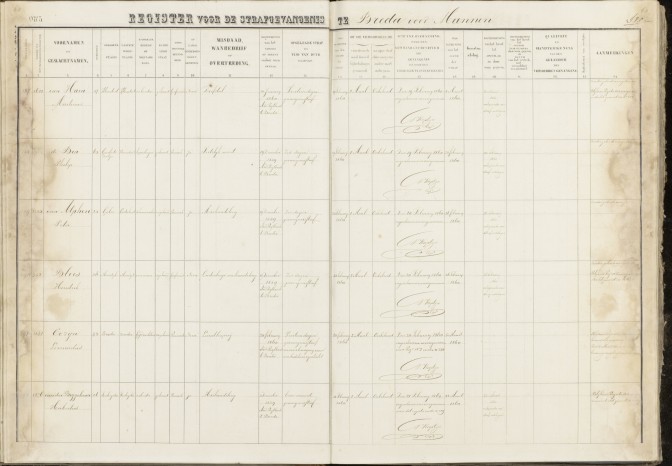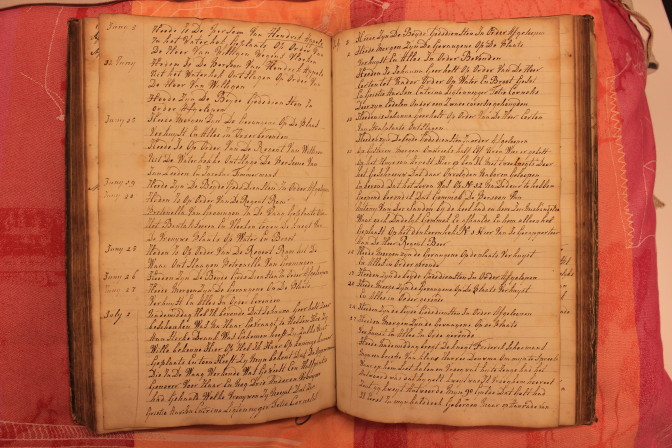Ironically, it’s often the black sheep that bring the most color to our family trees. I love researching all the stories in my family, and prison records are a wonderful resource.
History
Before the French occupation (1795-1813), people were rarely imprisoned. Instead, criminals were hanged, banished, put in the pillory or sent to the work house. The modern system of prisons was introduced in 1811.
In the 19th century, people were much more likely to be send to prison than today. Today, you only get prison sentences for serious offenses, and sentences are usually long. But two centuries ago, even petty crimes like smuggling some butter across the border could land you a few days in prison. You might be surprised how many relatives went to jail, so it is well worth searching for them.
Like all Dutch government institutions, prisons were required to keep records. These can help us find out if our ancestors were ever in prison.

Dome prison in Breda. Credits: Cultural Heritage Service
Admittance registers
The most useful prison record for genealogical purposes is the “inschrijvingsregister” [admittance register], in which all prisoners were recorded upon arrival.
Admittance registers may give the following information about a prisoner:
- Full name
- Date and place of birth (or age)
- Names of parents
- Language
- Religion
- Physical description
- Occupation
- Education
- Signature
- Crime for which they were convicted
- Date and court of the verdict
- Sentence, including start and end date
- Previous convictions
- Behavior while in prison
- Other notes
The registers will not provide much detail about the crime they committed, usually it is just a short indication (theft, assault, smuggling). The information about the verdict allows you to track the court case in court records, which will give you the full description of the crime and reasoning of the judges.
Example: Hubertus van den Biggelaar
The Brabants Historisch Informatie Centrum [Brabant Historical Information Center, the archives of the province of Noord-Brabant] have digitized all their prison records. Volunteers created an index containing information on over 100,000 criminals, which just became available online this week.
My mother’s ancestors are mostly from Noord-Brabant so I immediately searched for her ancestors. I found several, including her great-great-grandfather Hubertus van den Biggelaar (1833-1872).
His admittance register had the following information:1
He was recorded under number 192, with a reference to description register no. 1276. Hubertus van den Buggelaar, age 26, born and living in Terheijden, was a married laborer of the Roman Catholic faith who had had primary education. On 5 December 1859, he was convicted to one month imprisonment by the “arrondissementsrechtbank” [district court] of Breda for “mishandeling” [assault].
He arrived in the prison on 21 February 1860, his second time in prison. The information about his admittance states that he came from this register under number 109. He was discharged on 22 March 1860 after his sentence expired. A note says that he had been convicted before, see no. 109.
This gives me several things to follow up on:
- I can check the admittance record for prisoner number 109 to see if that is about his first imprisonment. Since the admission information refers to his previous imprisonment, it seems he served two consecutive sentences. Or did he commit assault while in prison?
- I can check the court records of the district court of Breda for 5 December 1859 to find the records of the criminal case against him. The BHIC has an online index of these records. The court records themselves can be accessed in the reading room in Den Bosch.
- I can check the court records for his first conviction.
- I can check the finding aid for the prison records to see if there is a log for the time he was there, to see what was going on and if he was involved in any incidents.
- I can check the population registers of Terheijden to see where he was living at the time.
This record gives us a glimpse into the life of Hubertus van den Biggelaar. It not only tells us about his crime, but also that he had some education. Of the six people on the page, he was one of three people to have had a primary education.
The timing is also interesting: he had been married in 1858, the year before the assault. I wonder what his wife felt about the situation. Their first known child was born in 1862 so at least he did not leave her with a newborn baby.
Prison logs
If your ancestor was in prison, it is worthwhile to check the finding aid for that prison to see if any of the logs have survived for the time he or she was there. Most of them did not survive but if you do find them they can give you a great deal of information.
Example: Prison logs of Rotterdam house of arrest
One page of the prison log of the Rotterdam house of arrest in 1825 gives us the following information:2
- Hendrik Appels was placed in the water cage from 5 to 12 June for an unnamed transgression.
- The sermons took place orderly.
- Pretonella [sic] van Groningen was placed in the “Waag” [Measuring house, probably a part of the prison complex] on water and bread for brutalizing and cursing against the hired hand from 20 to 25 June.
- Johanna Geerhoff was found to be very drunk. When asked, she confessed that the overseer in the “Waag” had given her half a pint of gin, together with three other women: Grietie Harsen, Catrina Ligtenijger, Tetie Cornelis. She was punished with water and bread from 2 July to 10 July.
- On 10 July, there was a lot of noise and the guard found thet “Gommok” had taken Antonij van der Sanden by the throat and was abusing him severely. Gommok was taken off him and placed in the dark cage number 1.
- 27 July. Klaas Harres Douwma reports that he has lost 90 guilders that he had hidden in his scarf.
The range of punishments is quite extraordinary. “Dark cage number 1” suggests there were more, and then there was the equally sinister sounding water cage. Discipline also seemed to be a problem, with the overseer handing out drinks to the women.
We will never get a complete picture of what life was like for our imprisoned ancestors, but these logs sure give us some idea. And this isn’t even a prison log, this is for the house of arrest, where suspects were sent while they were awaiting trial. It must have been a scary place!
Where to find prison records
Prison records are usually kept in the archives in the capital of the province where the prison was located. Most of them can only be accessed in the reading room, but some archives provide online access:
- Noord-Brabant prison records (index and digital images). Select “Uitgebreid zoeken” [advanced search] and then “gevangenisregisters” [prison registers]).
- Zeeland prison records (index only). Click on the dropdown and select “gedetineerde” [Detainee] as source.
Dutch Genealogy source score
 Amount of information about births, marriages, deaths
Amount of information about births, marriages, deaths
 Amount of background information about your ancestors
Amount of background information about your ancestors
 Online availability of scans
Online availability of scans
 Online availability of indexes or transcriptions
Online availability of indexes or transcriptions
 Easy to understand if you don’t know Dutch
Easy to understand if you don’t know Dutch
Notes
- Breda prison, admittance registers 1859-1861, p. 64, no. 192, Hubertus van den Biggelaar, 21 February 1860; “Stamboom” [Family tree], index and digital images, Brabants Historisch Informatiecentrum (http://www.bhic.nl : accessed 24 February 2015), option “Gevangenisregisters” [Prison registers].
- House of arrest (Rotterdam), “register van bijzondere voorvallen” [Register of remarkable occurrences], 1815-1839, call number 688, unpaginated, 5 June – 27 July 1825; “Strafinstellingen Rotterdam” [Penitentiary institutions Rotterdam], record group 3.05.10; Nationaal Archief, The Hague, the Netherlands.




Yvette,
As always you provide interesting information on unique records. I have a request that might stump you, however. My wife’s immediate ancestors immigrated to the US in the early 20th Century. Most of her great- and great-great Aunts and Uncles remained in the Netherlands. She had a cousin ask us if we’d seen any records showing her relatives having helped the Jews in the Netherlands during and preceding WWII. I realize that can be a touchy subject, but not sure what kinds of records might show that information.
Thanks,
Kirk Payne
Hi Kirk,
Thanks for your interesting question. I will write an article about it that will appear next Friday.
Yvette,
Great, I look forward to reading it. Thanks for taking this on.
Kirk
The article is now available at https://www.dutchgenealogy.nl/ask-yvette-are-there-any-records-of-people-who-helped-jews-in-world-war-ii/
Ooh, Yvette! The Zeeland prison records are full of van Cruijningens, my father’s Dutch ancestors! I’ve never seen anything about them before! / Of course, maybe I shouldn’t be so happy that there were so many of them in prison …
😀
Thank you!
Great find! And I fully understand your enthusiasm. Any ancestor that leaves a good paper trail is a welcome ancestor in my book 🙂
HOWDY GOING OVER WEB SITE GREAT THANXS PLAN ON MAKING TRIP TO BREDA/ ZUNDERT MY DUTCH FAMILLY THERE BRASPENNING MY UNDERSTANDING POSSIBLE CRIMINAL RECORD MURDER FLEE (BANISH) TO AMERICA BELIEVE ALSO BEEN MILITARY (ROYAL GUARD ) HAVE PHOTO AS SUCH HAVE POINTER WHERE GO BREDA FIND SUCH RECORDS LIBRARYS ARCHIVES
Hallo Yvette
Will the prison records of Arnhem ever come online. I know of a family member who was in prison during the war en he spend some time in the Koepel in Arnhem. Looking forward to hearing from you
The Arnhem records are kept at the Gelders Archief. I haven’t heard that they are digitizing the Arnhem prison records, so I recommend you contact them to ask them about it. However, prison records are only public after 75 years so most World War II records aren’t public yet so won’t become available online yet.
Hi Yvette
Can you tell me why why a dutch death notice doesn’t show how a person has died. In England and America it’s always mentioned.
Regards Elizabeth
Hello Yvette,
I’m trying to find out some more information on ‘Wildeboer’ Familia. I’m a son also Dutch born.
I appreciate any information you are willing to share with me.
Hope your having a nice eveing.
My husbands Great Gramdmother was in jail 1894 . We have the admittance register we dont remember getting. Somrone wrote in the.1970s Rotterdam then Schaarsberg
Yvette,
I was able to get the 12 page document of his conviction from the Drents Archief and via Gooogle translate think I have discovered that my great great grandfather was sentenced to 9 months in Huis van Bewaring in Assen in 1891. However, in a letter his wife wrote her family, I was lead to believe he was already in prison in 1888. Is it possible he was in one of these houses of arrest that you mention above? Can you tell me where I might find that kind of information? I’m longing to learn more about this!!
Thank you
De zeeuwen link gaat nog naar de ouder website.